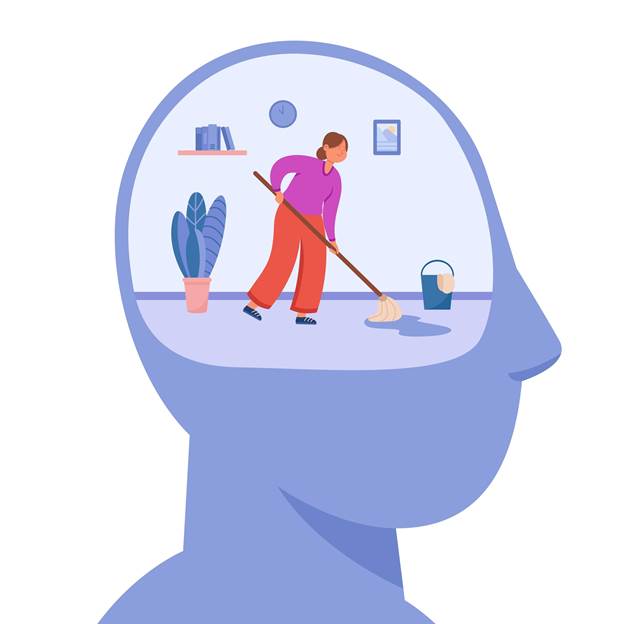When searching for detoxes on the internet, most of us are looking for ways to cleanse the gastrointestinal (GI) system or are on a search for supplements that support organs like your liver or kidneys. The brain, however, is another part of the human body that also benefits from the removal of toxins.
Below we review the functions of the brain that need support with detoxification and tips on how to keep your brain clean, let’s start with how the brain cleans itself.
The Glymphatic System: Night Cleaners of the Brain
The brain is one of the body’s most metabolically active organs. This means our brain cells use and process a lot of energy. It is busy consuming energy and information to support the central nervous system all day long and then at night, the night cleaners start their shift.
Also known as the glymphatic clearance pathway, the glymphatic system’s job is to remove waste located in the central nervous system. Along with tidying things up, the glymphatic system distributes glucose, lipids, amino acids, and neurotransmitters in the brain.
While sleeping, the glymphatic system pumps cerebral spinal fluid through the brain, flushing it of toxins and other waste. All of these janitorial services happen while you sleep and then switch back to daily brain function when you are awake.
Why Do People Need a Brain Detox?
Our glymphatic system has the potential to effectively cleanse the brain, but the reality is that most of us live a lifestyle that doesn’t support our body’s optimal function. Lack of or poor quality sleep is a problem for many.
Many of us also make poor dietary decisions and incorporate too many inflammatory foods into what we eat. As well, there is an inundation of more than the usual amount of stressors on all of us.
The result? The body's energy is redirected and our brain, heart, and muscles begin to suffer.
These factors set our night cleaners (aka the glymphatic system) up for the tough challenge of removing a lot of extra waste with less than an ideal amount of energy and time to do it. We then start feeling unwell, may experience chronic fatigue and weakness, and also suffer cognitive difficulties.
The result is a high level of toxins in the brain that lead to the following symptoms:
- Fatigue
- Brain fog
- Anxiety
- Depression
- Memory Loss
- Moodiness
- Lack of focus
Some people also seek out brain cleanses after brain injury or stroke, or because they are battling addiction. Others will maintain a brain cleansing routine as a preventative measure for neurodegenerative diseases.
Although almost everybody can benefit from a brain detox, you should consult with a doctor before starting any cleanse. There may be unique pre-existing health concerns to navigate before or during a brain detox that should be overseen by your medical practitioner.
How Do I Start a Brain Detox?
There are several steps you can take to help detoxify your brain. It is best to start in moderation with realistic goals.
Here are a few suggested ways to start detoxing your brain from the effects of contaminants, toxins, and inflammation. Try implementing one or two of the following and gradually adding other measures to see how successful your process is.
1. Go to Bed
Your mom was right when she said sometimes all you need is a good night’s rest. Making sure you get an adequate amount of sleep each night is one of the best and most effective ways to support your brain in its natural detoxification processes.
On average, adults need seven to nine hours of sleep per night to optimally function. Many distractions can make sleep hard to come by but here are a few things you can do to help improve your overall sleep hygiene:
- Try to sleep and wake at the same time daily to help regulate your circadian rhythm
- Make sure your bedroom is very dark and comfortably cool
- Establish a calming bedtime routine that helps trigger your brain to get ready for sleep Take a warm bath and/or read a book or journal to help slow your thoughts and relax
- Make sure to get exercise (especially outdoors!) during the day in order to help you sleep better
- If there are audible disturbances at night, try white noise
- Consult with your doctor about trying short-term supplements such as melatonin to help you get to rest
2. Change to an Anti-Inflammatory Diet
Diet plays a crucial role in managing and maintaining cognitive health. Many don’t realize how connected their gut is to neurological function.
A poor diet directly contributes to gut-related and intestinal problems as it can increase inflammation. This can not only cause your organs to not work as well as they should, but also contributes to poor brain health.
As a metabolically active organ, your brain needs constant nutrients in the form of healthy fats, protein, omega-3 fatty acids, antioxidants, and vitamins and minerals.
Some brain foods to add to your shopping cart include:
- Eat a rainbow of fruits and vegetables! As many as you want and in lots of colors! Fruits and vegetables are both high in several essential vitamins, minerals, bioflavonoids, and more which fight free radical damage.
- Herbs and spices
- Fermented and probiotic foods
- Legumes and beans
- Seeds and nuts
- Complex carbs
- Healthy fats (avocados, coconut oil, olive oil, grass-fed butter)
- Meats from grass-fed animals
- Wild-caught fish
- Pastured poultry
- Free-range eggs
- Foods high in vitamin C, copper, and manganese
- Lots of water to boost and maintain energy levels
On the flip side, you can also try an elimination diet as many common foods cause an inflammatory reaction in most of us. Try removing foods that can cause inflammation and stress on your body, such as processed meats, vegetable oils, and trans fats, added sugar, and highly processed foods in general.
3. Reduce or Eliminate Toxin Exposure
Unless you’re living in an unpopulated valley, out in the middle of the wilderness, it can be next to impossible to eliminate all exposure to toxic chemicals. Some lifestyle changes, however, can remove certain toxins from your everyday life.
Of course, smoking cigarettes should be eliminated and secondhand smoke should be avoided. You can also reduce your exposure to contaminants found in certain hair, skincare, and household products and choose organic, whole foods over processed alternatives to avoid pesticides or herbicides.
Toxic heavy metals should also be avoided by being conscious of your consumption of farmed fish or drinking contaminated water.
Even dental fillings and some food containers can also be sources of heavy metals. A Heavy Metal Chemical Cleanse or Advanced TRS Detox Spray can be a good solution to removing accumulated heavy metals while also helping the body better remove metals going forward.
4. Work it Out
Getting exercise can increase glymphatic activity and improve your brain’s ability to rewire itself. Plus, exercise can help you cope with stress, sleep more deeply, and have more energy in general.
Most adults should move their bodies in some form for at least 30 minutes a day and take part in moderate exercise for at least 150 minutes a week.
5. Try Supplements (Consult With Your Doctor)
Your body has a natural ability to detox, which can be encouraged by taking certain supplements that nourish the liver, kidneys, gut, and brain.
- Paratex to cleanse the body and boost the immune system
- Detoxadine to support thyroid function and hormone balance
- Liver Health to detox the liver and support digestion
- Kidney Health to support waste elimination and increase energy
- Vitamin C supports immune function, cardiovascular health, and antioxidation
6. Consider Intermittent Fasting
Some studies have shown that fasting can help protect us against neurological diseases like Alzheimers disease and Parkinsons disease. The proteins involved in brain aging can be influenced by fasting which also has been shown to decrease oxidative stress and inflammation.
What are the Risks or Side Effects of a Brain Detox?
It can be tempting to go all in with your brain detox but it is best to start with one big change at a time. Making too many big lifestyle changes at once may make you feel much worse before feeling better which is what no one wants.
You will potentially notice flu-like symptoms that may not be related to the brain detox but are common when taking on a drastic change in diet, supplement routine, or exercise regime. These symptoms are likely temporary but should be brought up to a physician if there are concerns.
Symptoms such as nausea, headaches, and fatigue are common, as well as irritability, cravings, even loose stools, and upset stomach.
Final Thoughts
The glymphatic system in the brain has an important job of removing harmful toxins and waste from the brain. This cleansing process naturally occurs while we’re asleep but environmental and lifestyle factors can impair the glymphatic system’s ability to tidy up our brains.
This makes us vulnerable to health issues such as brain fog, fatigue, poor memory, and neurodegenerative diseases.
A brain cleanse is a useful way to detox the brain that can lead to other positive health benefits. Getting good sleep and enough of it is a primary step in cleaning the brain.
You can also get exercise and go outside, try an anti-inflammatory or elimination diet, and incorporate intermittent fasting and helpful supplements to detox the brain as effectively as possible.
Everyone should aim to reduce or eliminate unnecessary toxin exposure by being mindful of the products they use, the food they consume, and other environmental factors.
Starting a brain detox can have similar side effects as starting any new diet or exercise program. After a few weeks of brain detoxing, you should start feeling better, re-energized, and clearer thanks to the clean-up inside your head!



